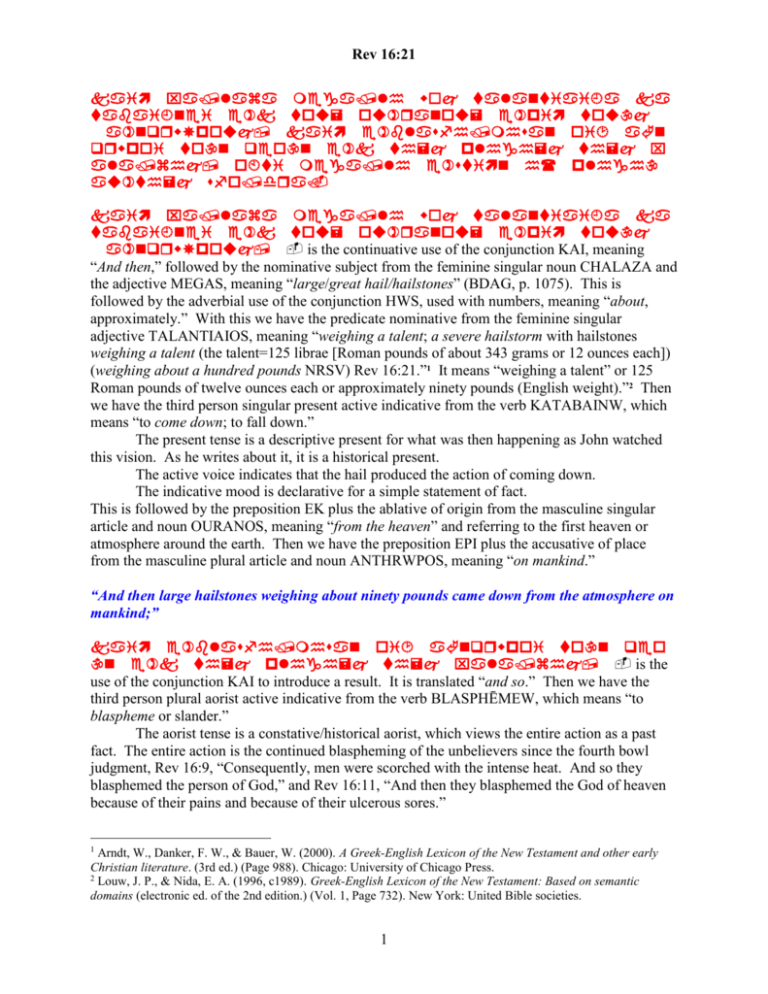Rev 16_21 - Amador Bible Studies
advertisement

Rev 16:21 is the continuative use of the conjunction KAI, meaning “And then,” followed by the nominative subject from the feminine singular noun CHALAZA and the adjective MEGAS, meaning “large/great hail/hailstones” (BDAG, p. 1075). This is followed by the adverbial use of the conjunction HWS, used with numbers, meaning “about, approximately.” With this we have the predicate nominative from the feminine singular adjective TALANTIAIOS, meaning “weighing a talent; a severe hailstorm with hailstones weighing a talent (the talent=125 librae [Roman pounds of about 343 grams or 12 ounces each]) (weighing about a hundred pounds NRSV) Rev 16:21.”1 It means “weighing a talent” or 125 Roman pounds of twelve ounces each or approximately ninety pounds (English weight).”2 Then we have the third person singular present active indicative from the verb KATABAINW, which means “to come down; to fall down.” The present tense is a descriptive present for what was then happening as John watched this vision. As he writes about it, it is a historical present. The active voice indicates that the hail produced the action of coming down. The indicative mood is declarative for a simple statement of fact. This is followed by the preposition EK plus the ablative of origin from the masculine singular article and noun OURANOS, meaning “from the heaven” and referring to the first heaven or atmosphere around the earth. Then we have the preposition EPI plus the accusative of place from the masculine plural article and noun ANTHRWPOS, meaning “on mankind.” “And then large hailstones weighing about ninety pounds came down from the atmosphere on mankind;” is the use of the conjunction KAI to introduce a result. It is translated “and so.” Then we have the third person plural aorist active indicative from the verb BLASPHĒMEW, which means “to blaspheme or slander.” The aorist tense is a constative/historical aorist, which views the entire action as a past fact. The entire action is the continued blaspheming of the unbelievers since the fourth bowl judgment, Rev 16:9, “Consequently, men were scorched with the intense heat. And so they blasphemed the person of God,” and Rev 16:11, “And then they blasphemed the God of heaven because of their pains and because of their ulcerous sores.” 1 Arndt, W., Danker, F. W., & Bauer, W. (2000). A Greek-English Lexicon of the New Testament and other early Christian literature. (3rd ed.) (Page 988). Chicago: University of Chicago Press. 2 Louw, J. P., & Nida, E. A. (1996, c1989). Greek-English Lexicon of the New Testament: Based on semantic domains (electronic ed. of the 2nd edition.) (Vol. 1, Page 732). New York: United Bible societies. 1 Rev 16:21 The active voice indicates that mankind produced the action. The indicative mood is declarative for a simple statement of fact. This is followed by the nominative subject from the masculine plural article and noun ANTHRWPOS, which means “mankind or men.” Then we have the accusative direct object from the masculine singular article and noun THEOS, meaning “God.” This is followed by the preposition EK plus the ablative of cause from the feminine singular article and noun PLĒGĒ with the descriptive genitive or genitive of identity from the feminine singular article and noun CHALAZA, meaning “because of the plague of hail.” “and so men blasphemed God because of the plague of hail,” is the causal use of the conjunction HOTI, meaning “because,” followed by the predicate nominative from the feminine singular adjective MEGAS, meaning “great, severe (BDAG, p. 624). Then we have the third person singular present active indicative from the verb EIMI, meaning “to be: was.” The present tense is a historical present (following an aorist tense), which presents the action as continuing in the past (since John is writing after seeing the vision). The active voice indicates that the plague produced the action of being what it is. The indicative mood is declarative for a simple statement of fact. This is followed by the nominative subject from the feminine singular article and noun PLĒGĒ, meaning “the plague.” With this we have the possessive genitive from the third person feminine singular personal use of the intensive pronoun AUTOS, meaning “its.” Finally, we have the adverb of degree SPHODRA, which means “a very high point on a scale of extent, very (much), extremely, greatly Mt 2:10; Mk 16:4; Lk 18:23; Rev 16:21.”3 “because its plague was extremely severe.” Rev 16:21 corrected translation “And then large hailstones weighing about ninety pounds came down from the atmosphere on mankind; and so men blasphemed God because of the plague of hail, because its plague was extremely severe.” Explanation: 1. “And then large hailstones weighing about ninety pounds came down from the atmosphere on mankind;” a. The next thing John sees in this vision is a hailstorm beyond anything ever described in the history of mankind. The hailstones are described as weighing about ninety pounds, which means that the force of the updrafts of air necessary to create hail this size has to be incredible. Hail is created when rain falls and then an updraft of air takes the rain higher in the atmosphere where it freezes and falls again. An updraft of air then takes the hail back up with its added layer of moisture, which freezes, creating a bigger hail stone. Each time this occurs the hail stone 3 Arndt, W., Danker, F. W., & Bauer, W. (2000). A Greek-English Lexicon of the New Testament and other early Christian literature. (3rd ed.) (Page 980). Chicago: University of Chicago Press. 2 Rev 16:21 becomes larger and larger. It would take winds greater than 100 miles an hour to create this kind of hail. It would take tornado type storms to create this.4 b. Hail was associated with the first trumpet judgment in Rev 8:7, “And then the first one sounded his trumpet; and there occurred hail and fire having been mixed with blood, and it was thrown to the earth; and one-third of the land was destroyed by fire; that is a third of the trees were burned up and all the green grasses.” c. Hail is associated with the manifestations of God as in Rev 11:19, “And then the temple of God which is in the heaven was opened. And the ark of His covenant was seen in His temple. And then there occurred flashes of lightning and noises and peals of thunders and an earthquake and a great hailstorm.” d. Hail was used in judgment against Egypt, Ex 9:23, against Israel, Hag 2:17, and against Gog, Ezek 38:18-22. A hail-storm destroyed the army of the Amorites when they fought against Joshua, Josh 10:11.5 Isa 30:30, “And the Lord will cause His voice of authority to be heard, and the descending of His arm to be seen in fierce anger, and in the flame of a consuming fire in cloudburst, downpour and hailstones.” e. This is obviously divine judgment from God against the unbelievers worshiping the beast and his image. f. The fact this judgment comes from heaven down upon these unbelievers is clearly indicative of a judgment from God. 2. “and so men blasphemed God because of the plague of hail,” a. As a result of this plague of hail the unbelievers who survive the plague blaspheme and slander God. Many unbelievers will die from this plague, and therefore, only the survivors will be able to blaspheme God. b. This indicates that these unbelievers clearly recognize the judgment as coming from God and not a natural event of nature. They recognize this as a supernatural event. c. These unbelievers will blaspheme God because of the loss of their loved ones, homes, cars, destruction of crops, property, etc. d. Whatever did not collapse from the great earthquake is now pounded into ruin by the giant hail. e. Between the earthquake and the hailstorm there is virtually nothing left to live for as far as these unbelievers are concerned. 3. “because its plague was extremely severe.” a. The reason why the unbeliever survivors of this hail blaspheme God is now given. The magnitude of this hailstorm is “extremely severe.” b. This is no understatement or exaggeration. It is an accurate assessment by God of what He does to the unbelievers of the world. c. When the Bible calls something extremely severe, it is totally devastating in every sense of the word. Osborne, p. 600, “One of my students figured such a hailstone would be 17.6 inches in diameter (at 59.8 pounds per cubic foot). In The Guinness Book of Records 1997 (p. 114), the largest hailstones in recorded history (2.25 pounds) fell on Bangladesh on April 14, 1986, killing 92 people. The largest in the United St ates (1.67 pounds, a diameter of 5.62 inches) fell on Coffeyville, Kansas, on Sept. 3, 1970.” 5 Easton, M. (1996, c1897). Easton’s Bible Dictionary. Oak Harbor, WA: Logos Research Systems, Inc. 4 3 Rev 16:21 d. People, animals, crops, structures of every kind, and property of every type are destroyed when hit by 90 pound hail falling at 90 miles per hour (the speed of gravity on a falling object = 132 feet per second/per second). e. Everything the unbeliever owns and values is destroyed, including many of the people they love. f. This hailstorm is the final event on earth prior to the day of the second advent of Christ. When Christ returns, He returns to a world completely and totally destroyed by His judgments on the unbeliever. This explains why the establishment of our Lord’s kingdom on earth is such a contrast to the total “chaos and emptiness” (the “TOHU WABOHU” of Gen 1:2) that results from Satan’s kingdom on earth. John will now take us on a side trip to show us what happens to the capital (Rome) and kingdom (the Revived Roman Empire with its religious humanistic-paganism and idolatry plus its economic greed and control) of the Antichrist in Rev 17:1-18:24 during the last half of the Tribulation. 4






